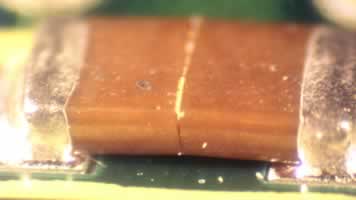Multilayer ceramic capacitors (MLCs) have become one of the most widely used components in the manufacture of surface mount assemblies, and are inherently very reliable. But because they are made of ceramics that is brittle, these normally trustworthy devices can fail unexpectedly if they are not handled right in the electronics layout design and manufacturing. MLCs can fail either immediately or (arguably much more seriously) during service. Failure mechanisms in ceramic capacitors article tells you more about how to correctly use MLCs, what not to do and how those capacitors usually fail. When you investigate failures, you should always expect the unexpected. Cracks are always bad news! The following picture of failed capacitor is from Failure mechanisms in ceramic capacitors article.

2 Comments
boots clearance says:
I surely didn’t realize that. Learnt a thing new today! Thanks for that.
Tomi Engdahl says:
Stressed out over capacitor failure
http://www.edn.com/electronics-blogs/tales-from-the-cube/4406033/Stressed-out-over-capacitor-failure
We read several application notes about MLC capacitors and learned that because of their brittle nature, multilayer ceramic capacitors are more susceptible to excesses of mechanical stress than other components used in surface mounting. In our case, when we tighten the mounting screws, the PCB bends slightly. Excessive bending of the board can create mechanical cracks within the ceramic capacitor. Over time, moisture penetrates the crack and can cause a reduction in insulation resistance that is accelerated by humidity and temperature, and this generates a conductive path. As a result, it gets shorted and because of high current flow through the capacitor, the capacitor gets burned. Although these mechanical cracks may not lead to capacitor failure during the final assembly test, failures may occur once the product is in the field, when they are expensive and time consuming to correct.